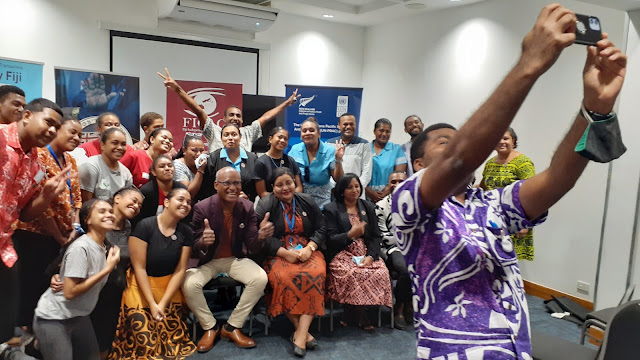Fiji Anti-Corruption Course Garners Regional Interest

The new free online anti-corruption course aimed at curbing corruption in Fiji and the Pacific has attracted over 1,400 registrations. The College of Humanities and Education of the Fiji National University in partnership with CLCT Integrity Fiji are pleased to spearhead this initiative which has been supported by the Australian and New Zealand Departments of Foreign Affairs and Trade through Transparency International.
The online course supports the Fijian Government's plan to make Fiji a knowledge-based society predicated on a culture of integrity and transparency. Given that the Fiji National University is also a provider of quality education in the Pacific region, it is noteworthy that there has also been enrolments recorded from the Republic of the Marshall Islands, Vanuatu, Solomons and Papua New Guinea.
Samu Walosio, a spokesman for CLCT Integrity Fiji said, “We are very excited about the MOOC Free anti-corruption online course because it will enable successful participants to enrol in degree level studies in Governance and Applied Social Science. We are truly blessed to be partnering with the College of Humanities and Education. The field of Humanities which encompasses anti-corruption has so much relevance to people in Fiji and the Pacific.”
The anti-corruption course aims to get participants to be Integrity Champions supporting FICAC and other Pacific regional anti-corruption agencies in the fight against corruption.
The course developed by the Department of Ethics and Governance with inputs from CLCT Integrity Fiji emphasises Ethics as it deals with resolving issues of morality. It does this through defining morally diverse concepts such as good and evil, right and wrong, virtue and vice, justice and crime.
Why is Ethics within this context so important in the very important field of Anti-Corruption?
When one is faced with a situation where one has to choose between good and evil, right and wrong, virtue and vice, justice and crime, one will take action that promotes Integrity.
In this course, we take the view that participants are role models and through their affirming personal actions, they will spread the ethical values of integrity in all spheres of their lives.
This course will also help participants to reflect on the values that shape their lives and whether they promote Integrity or lead to unwise actions. Ethics is conceptualized as a solution to effectively dealing with corruption.
Modules 1 and 2 look at ethical theories and practice to help participants think more deeply and critically about issues concerning right and wrong and what one ought to do and ought not to do. This has become ever so important as corruption is pervasive and occurs in all walks of life in Fiji, the Pacific and the world.
Apart from Eurocentric models, the course also emphasizes traditional cultural ways of viewing Ethics and Anti-Corruption.
Module 3 defines corruption as the abuse of entrusted power for private gain. Exposing corruption and holding the corrupt to account can only happen if we understand the way corruption works and the systems that enable it. The module discusses the social, economical and environmental costs of corruption and what we can do to curb corruption.
Module 4
looks at how Civil Society, the Business Sector and Government can
work together with Anti-Corruption Agencies to curb corruption in all its
forms. Participants are
Module 5 is very important for everyone who enrolls in this course. We would like to mobilize the public in Fiji and the Pacific to be role models of Ethics and Integrity playing dynamic and proactive roles as Anti-Corruption Champions.
Conclusion: We hope that after completing this course, you will consider taking programs in the Fiji National University College of Humanities and Education or consider working with CLCT Integrity Fiji / Transparency International or utilize other ways you can spread the message of Integrity and Anti Corruption in your homes, schools, communities and Pacific nations.


Comments
Post a Comment